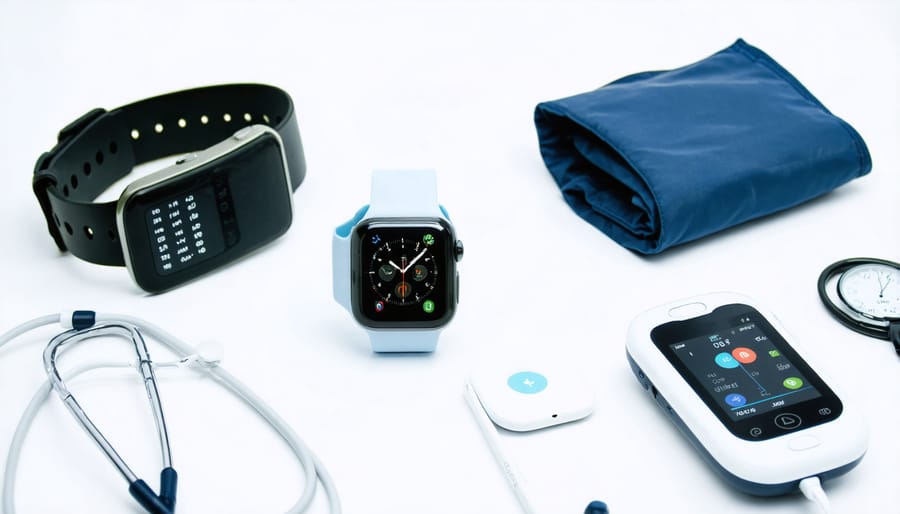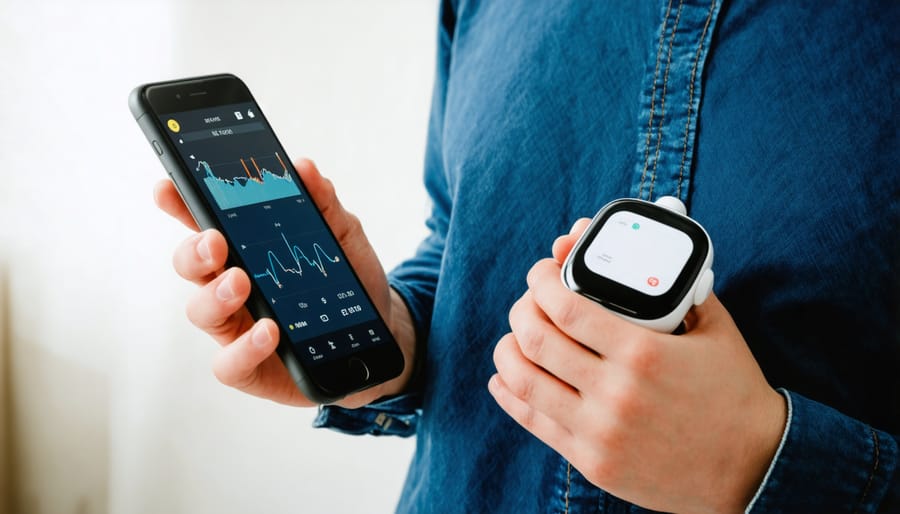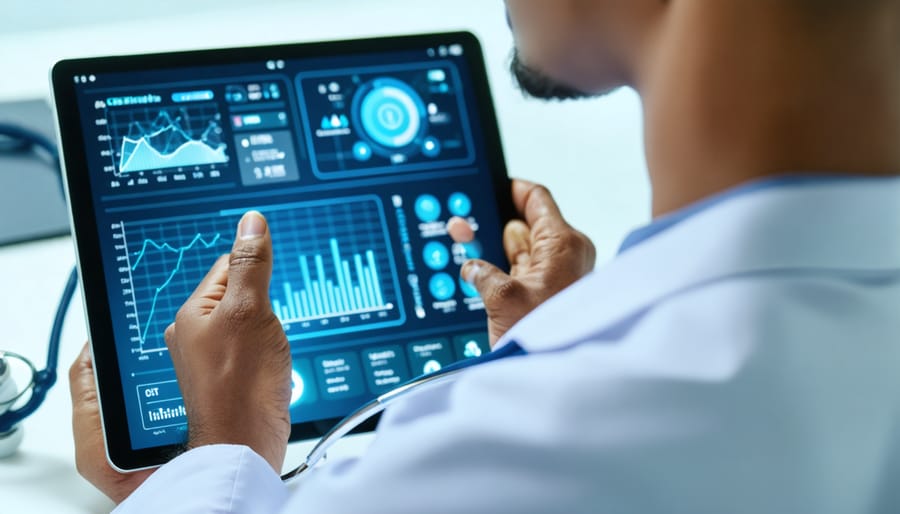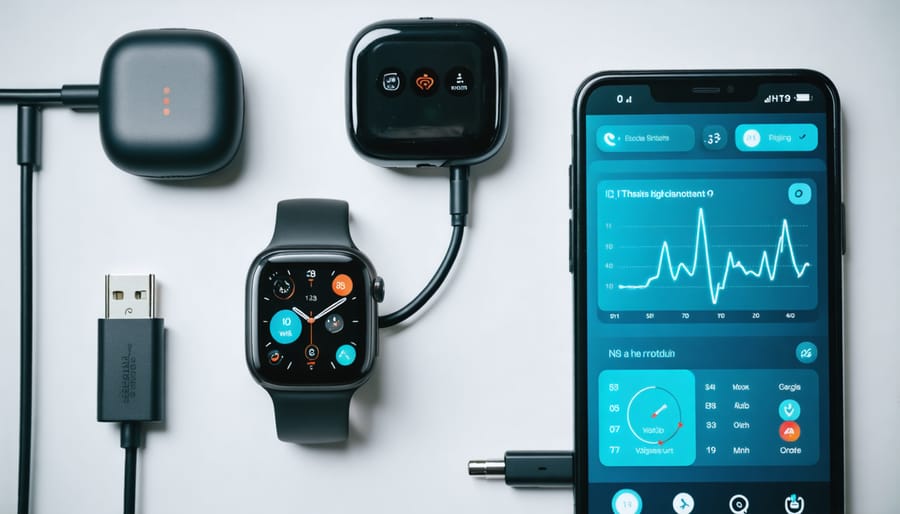Transform your healthcare journey with Internet of Things (IoT) medical devices that put life-changing monitoring power in your hands. From smart insulin pumps that automatically adjust medication levels to wearable heart monitors that alert your doctor in real-time, IoT medicine is revolutionizing how Albertans manage chronic conditions. These connected devices work together seamlessly, creating a digital safety net that catches health issues before they become emergencies.
Today’s IoT medical solutions combine the convenience of home monitoring with the expertise of healthcare professionals. Your blood pressure readings, glucose levels, and heart rhythms can be tracked and analyzed continuously, giving you and your healthcare team the insights needed to make better treatment decisions. For many Albertans living with chronic conditions, these smart devices have become essential tools for maintaining independence and peace of mind.
Whether you’re managing diabetes, heart disease, or other ongoing health concerns, IoT medicine offers a practical path to more effective, personalized care right here in Alberta.
How IoT Medicine Works in Daily Life
Connected Health Devices You Can Use Today
Several medical wearables and connected health devices are readily available in Alberta’s pharmacies and medical supply stores. Smart blood pressure monitors like the Omron Evolv and QardioArm can automatically track your readings and share them with your healthcare team. For diabetes management, devices like the FreeStyle Libre and Dexcom G6 continuous glucose monitors provide real-time blood sugar data through your smartphone.
Many Albertans are already using smartwatches and fitness trackers from Apple, Fitbit, and Garmin to monitor their heart rate, sleep patterns, and physical activity. These devices can alert you to potential health concerns and help you maintain a healthy lifestyle.
For medication management, smart pill dispensers like MedMinder and Hero can remind you when it’s time to take your medications and track your adherence. Remote patient monitoring systems, such as the TytoCare device, allow you to perform basic health examinations at home and share the results with your healthcare provider through secure platforms.
Remember to discuss these options with your healthcare provider to determine which devices best suit your needs and health goals.

Real-Time Health Monitoring Made Simple
Modern remote health monitoring systems have transformed the way we track our health. These smart devices automatically collect vital signs like heart rate, blood pressure, and blood sugar levels throughout the day, sending this information directly to your healthcare team. You don’t need to be tech-savvy – most devices work right out of the box, automatically syncing with your smartphone or tablet. They’ll alert you when something needs attention, like an irregular heart rhythm or high blood sugar, and can even remind you to take medications. For Albertans managing chronic conditions, this means fewer emergency room visits and more peace of mind knowing that help is just a notification away. The data collected helps your healthcare provider make better-informed decisions about your treatment plan, catching potential issues before they become serious.
Managing Specific Conditions with Smart Devices
Diabetes Management
Modern IoT devices have revolutionized diabetes management, making it easier and more precise than ever before. Smart glucose monitors now provide real-time blood sugar readings without painful finger pricks, sending data directly to your smartphone or healthcare provider. These continuous glucose monitoring (CGM) systems track patterns throughout the day and night, helping you understand how different activities and foods affect your levels.
Connected insulin pumps work alongside these monitors, automatically adjusting insulin delivery based on your current needs. Some systems can even predict potential low blood sugar episodes and alert you before they happen, giving you time to take preventive action.
Here in Alberta, many diabetes clinics now offer support for setting up and using these smart devices. They can help you learn how to interpret the data and make informed decisions about your care. The devices can also share information with family members or caregivers, creating a stronger support network for managing your condition.
These IoT solutions have shown impressive results in helping people maintain stable blood sugar levels and reduce complications from diabetes. They’re particularly valuable during our cold Alberta winters when regular clinic visits might be challenging.

Heart Health Monitoring
Modern IoT devices are revolutionizing how Albertans monitor their heart health from home. Smart watches and chest-worn monitors now track heart rate, rhythm, and irregularities in real-time, sending instant alerts if concerning patterns emerge. These devices offer peace of mind, especially for those managing heart conditions or recovering from cardiac events.
Blood pressure monitoring has also become more convenient and precise with IoT technology. Smart blood pressure cuffs automatically record readings, track trends over time, and sync data directly to your smartphone or healthcare provider’s system. Many devices can even remind you when it’s time for your next reading, helping you stay consistent with your monitoring schedule.
The data collected by these devices helps both you and your healthcare team make more informed decisions about your heart health. Your doctor can review detailed reports showing how your heart responds to different activities, medications, or lifestyle changes. This continuous monitoring allows for earlier detection of potential issues and more timely interventions when needed.
For best results, talk to your local healthcare provider about which heart monitoring devices are most appropriate for your specific needs and how to properly use them.
Weight Management and Activity Tracking
Smart scales and fitness trackers have revolutionized how we manage weight and stay active. These IoT devices do more than just count steps – they create detailed pictures of your daily habits and health patterns. Modern smart scales measure not just weight, but also body composition, including muscle mass and body fat percentage, giving you a clearer understanding of your overall health.
Many Albertans are using these devices to set realistic fitness goals and track their progress. Activity trackers can monitor your heart rate, sleep quality, and exercise intensity, providing personalized feedback to help you make healthier choices. They can even send gentle reminders to move when you’ve been sitting too long, which is especially helpful for office workers.
The real power comes from how these devices connect with your healthcare team. Your activity and weight data can be shared directly with your doctor, helping them provide more targeted advice for your health journey.
Benefits for Patients and Healthcare Providers

Better Treatment Decisions
Continuous health monitoring through IoT devices provides healthcare providers with a more complete picture of your health status, leading to better-informed treatment decisions. Instead of relying on occasional check-ups, your healthcare team can access real-time data about your vital signs, medication adherence, and lifestyle patterns. This comprehensive approach to secure health data management allows doctors to spot concerning trends early and adjust your treatment plan accordingly.
For Albertans managing chronic conditions like diabetes or heart disease, this means more personalized care based on your unique health patterns. Your healthcare provider can see how your body responds to different medications, activities, or dietary changes throughout the day. This detailed insight helps them fine-tune your treatment plan, reducing trial and error in finding the most effective approach. The result is more targeted interventions, fewer unnecessary medications, and better health outcomes tailored to your specific needs.
Early Warning Systems
Modern IoT devices are revolutionizing how we detect health issues, acting like round-the-clock health guardians. These smart devices continuously monitor vital signs and daily activities, picking up subtle changes that might signal developing health problems. For example, a smartwatch can detect irregular heart rhythms before you feel any symptoms, while connected glucose monitors can alert you to dangerous blood sugar trends.
Here in Alberta, many healthcare providers are embracing these early warning systems to help patients stay ahead of complications. Smart devices can track everything from sleep patterns to blood pressure, creating a detailed picture of your health over time. When these devices notice concerning patterns, they can send alerts to both you and your healthcare team.
The real power of these systems lies in their ability to learn your normal patterns and flag meaningful changes. This proactive approach helps catch potential health issues early, when they’re often easier and less expensive to treat. For many Albertans managing chronic conditions, these early warning systems provide peace of mind and greater control over their health journey.
Getting Started with IoT Medicine
Choosing the Right Devices
When selecting IoT medical devices, start by consulting with your healthcare provider to determine which devices best suit your specific health needs. Look for devices that are Health Canada approved and carry proper certifications to ensure reliability and safety.
Consider the device’s ease of use – it should have a user-friendly interface and clear instructions that you can easily follow at home. Check if the device is compatible with your smartphone or tablet, and verify that it works with your preferred health apps or your healthcare provider’s monitoring system.
Battery life and connectivity are crucial factors. Choose devices with long-lasting batteries and reliable Bluetooth or Wi-Fi connections, especially important during Alberta’s harsh winters when you might not want to venture out for replacements or repairs.
Pay attention to data security features. Your health information is private, so select devices with strong encryption and password protection. Many Alberta healthcare facilities have specific requirements for IoT devices, so ensure your choice aligns with these standards.
Remember to consider the ongoing costs, including subscription fees, replacement parts, and whether the device is covered by Alberta Health Care or your private insurance.
Working with Your Healthcare Team
Getting the most out of IoT medical devices starts with open communication with your healthcare team. Book an appointment with your family doctor to discuss incorporating smart medical devices into your treatment plan. Bring a list of your health goals and any specific devices you’re interested in using.
Your healthcare provider can help you choose the right IoT devices for your needs and explain how to use them effectively. They’ll also set up a system for monitoring your data and establish clear guidelines for when you should seek medical attention based on your readings.
Many Alberta clinics now offer virtual care options that work seamlessly with IoT devices. Ask about connecting your devices to your clinic’s patient portal or electronic health record system. This integration allows your healthcare team to track your progress in real-time and make timely adjustments to your treatment plan.
Remember to regularly review your device data with your healthcare team during check-ups. This collaborative approach ensures you’re getting the most benefit from your IoT medical devices while maintaining safe and effective care management.
Consider asking about local support groups or educational sessions where you can learn more about using your devices effectively.
The integration of IoT technology in medicine has revolutionized how we manage chronic conditions, offering hope and practical solutions for Albertans living with ongoing health challenges. These smart devices and connected systems have transformed traditional healthcare into a more proactive, personalized experience that empowers patients to take control of their health journey.
From continuous glucose monitoring for diabetes to smart inhalers for asthma management, IoT solutions are making it easier than ever to track, manage, and improve chronic health conditions. The real-time data and insights these devices provide not only help patients make informed decisions about their health but also enable healthcare providers to deliver more targeted and effective care.
As we look to the future, the potential for IoT medicine continues to grow. Whether you’re managing a chronic condition or simply interested in taking a more proactive approach to your health, now is the perfect time to explore these innovative solutions. Talk to your healthcare provider about which IoT medical devices might be right for you, and take advantage of the growing network of support and resources available right here in Alberta. Together, we can embrace these technological advances to create healthier, more connected communities.

